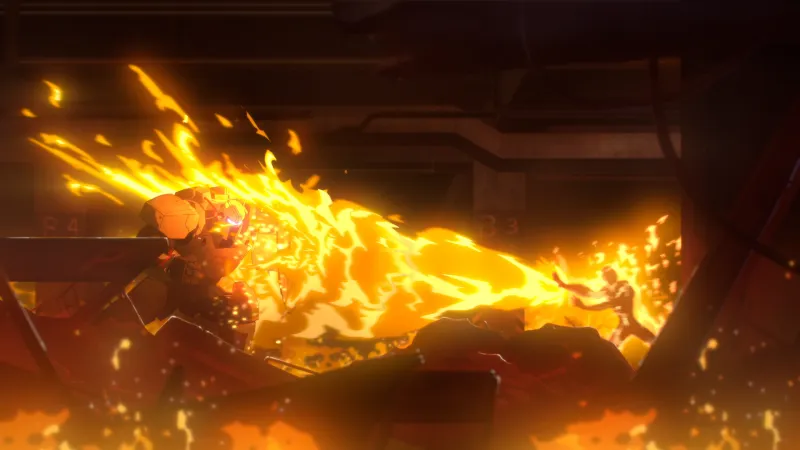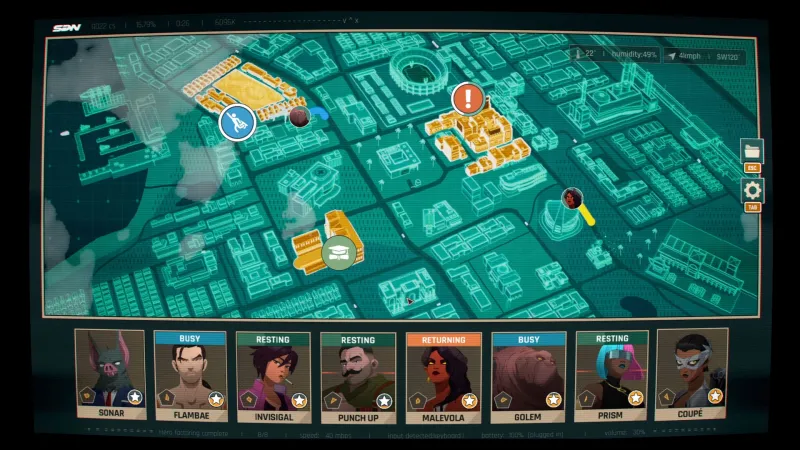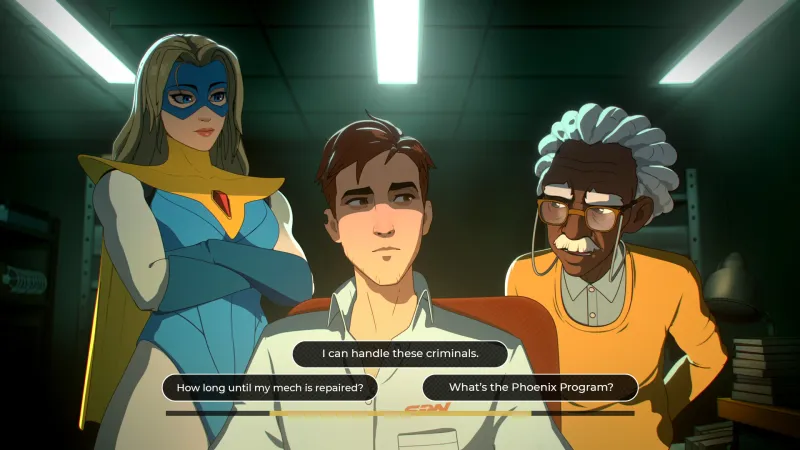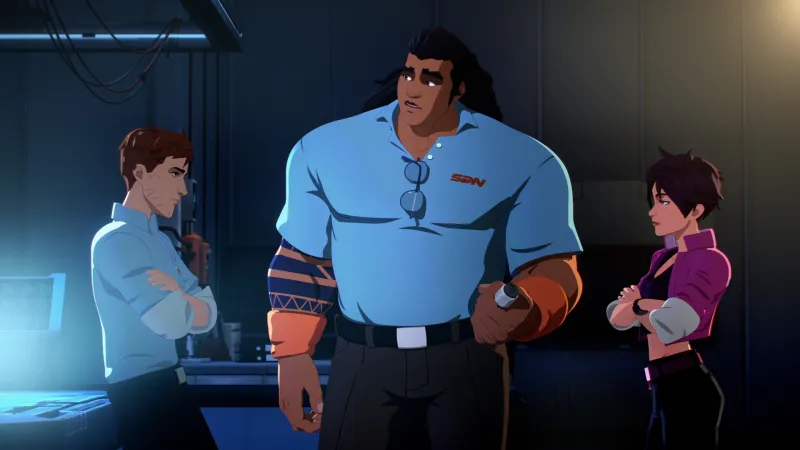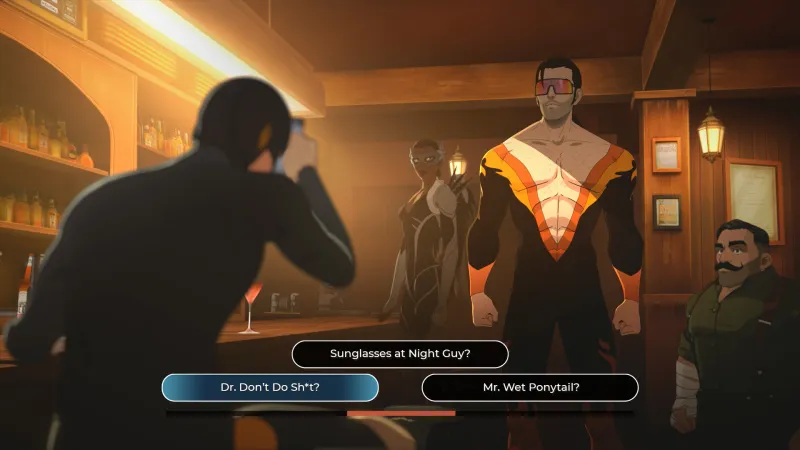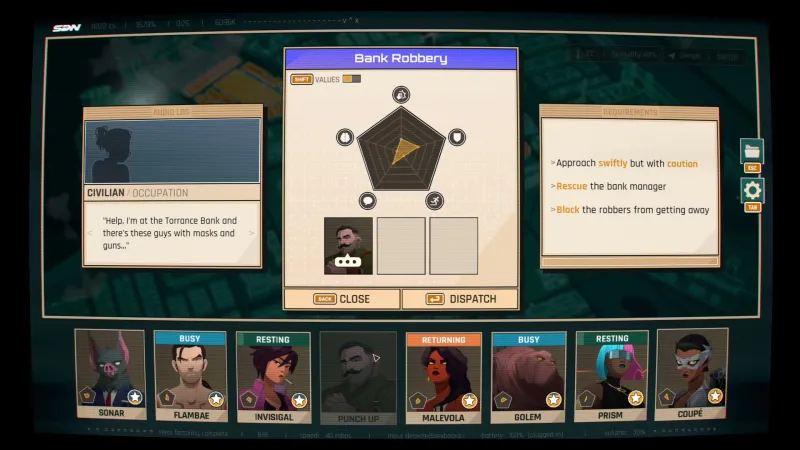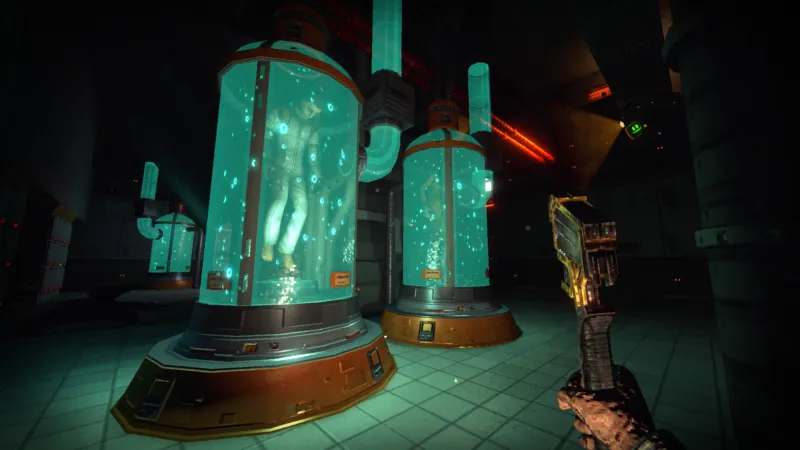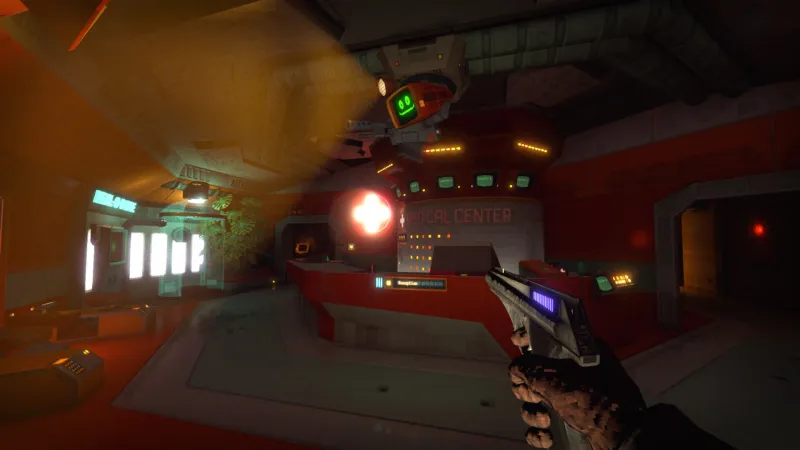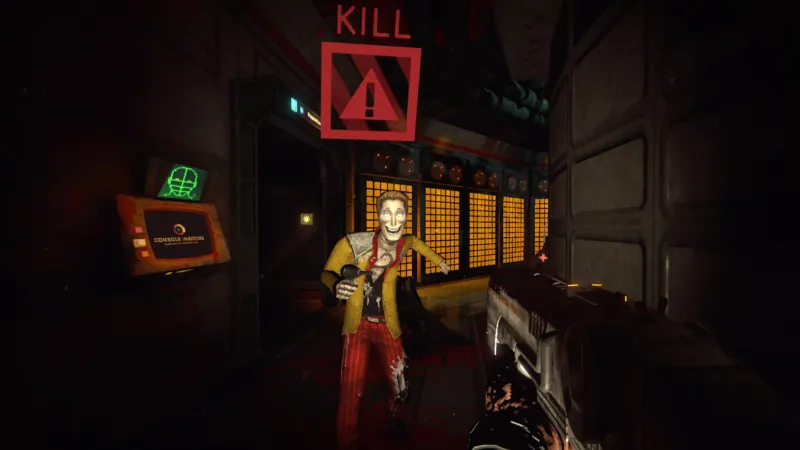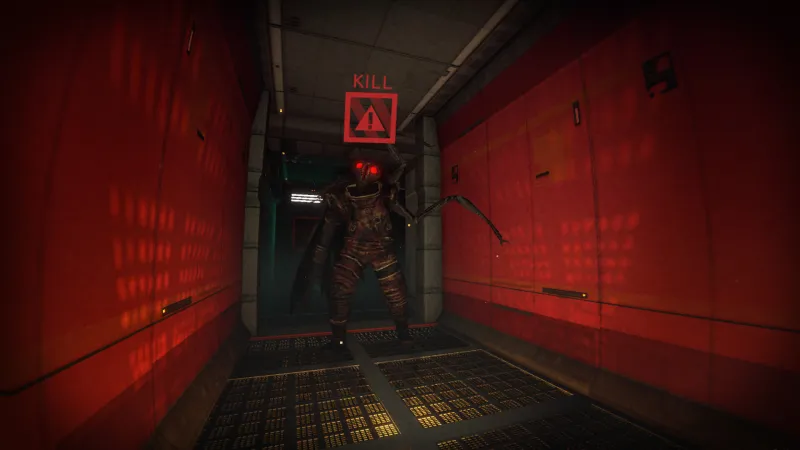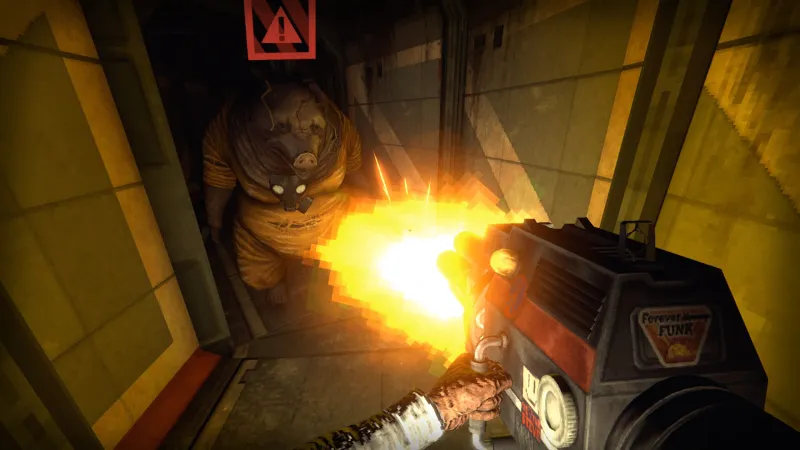Reading List
The most recent articles from a list of feeds I subscribe to.
Dispatch Review - With Great Power Comes Guaranteed Paperwork
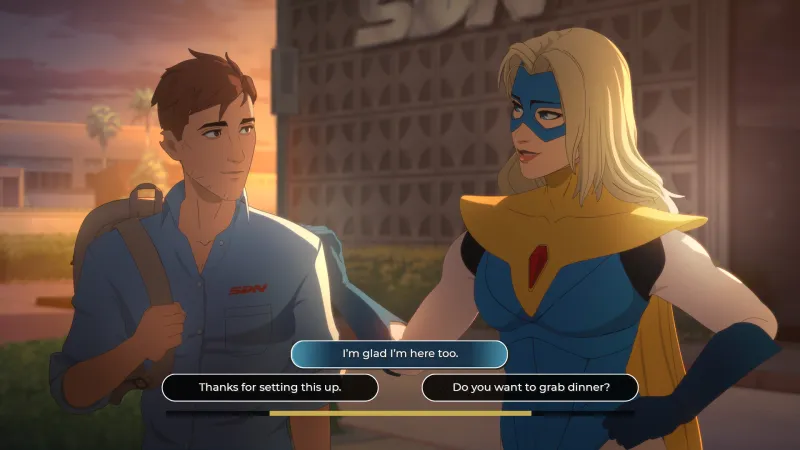
Reviewed on:
PC
Platform:
PlayStation 5, PC
Publisher:
AdHoc Studio
Developer:
AdHoc Studio
Release:
Video games have been trying to compete with film for years. Some developers hire A-list actors, pile on cinematic spectacle, and chase Hollywood flash like a cartoon coyote chasing its prey. While trying to compete with film, games have often adopted the language of cinema. Dispatch offers an alternative. Instead of imitating movies, it borrows liberally from prestige television, showcasing character-driven storytelling, slow-burn drama, and high emotional stakes that tighten with every episode.
AdHoc Studio is still a young team, but it came out of the gate swinging. Its first game proves that the old Telltale adventure formula was never broken; it just needed a rewrite. Dispatch is a compelling interactive drama that feels like binge-watching a stylish new superhero series. And in this case, the writing is the ultimate star.
Dispatch’s narrative gripped me from its opening minutes. The story follows Robert Robertson, the third in a long line of high-tech heroes who go by the moniker Mecha Man. When Robert's powerful mecha suit is trashed during a catastrophic mission, he's forced to rethink his life choices and ultimately joins the Superhero Dispatch Network. As you might guess from the name, SDN is a superhero-run organization dedicated to routing heroes to emergencies around the city.
Now desk-bound, Robert’s life quickly devolves into a tightrope act as he manages crises behind the scenes while juggling office politics, broken egos, and a messy love life. It’s a refreshing take on old superhero tropes, focusing on bureaucracy and complex relationships rather than grand spectacle – though there are some spectacular fights along the way. The writing balances sardonic workplace humor with genuine heart; I found myself laughing out loud at Robert’s deadpan exchanges with other heroes.
The choices in Dispatch flow as naturally as conversation. Thankfully, none of the options flash "good" or "bad" like a neon sign; everything feels grounded and human… well, superhuman. Dispatch’s choices consistently compelled me to think through their consequences. I actually had to pause the game when I was asked if I wanted to reveal my secret identity to a reformed villain who despised Mecha Man but didn’t know I was the man behind the machine. Not every decision carries this kind of gravity, and the choices don’t radically rewrite the overarching plot, but I didn’t care because the larger narrative felt so sturdy. Instead, those smaller choices quietly reshape relationships, background events, and inform your ending. These ripple effects made me want to start a second playthrough the moment the credits rolled, just to see how things would tilt the other direction.
The main gameplay diversion is the mission dispatch system, where you send heroes into the field while you manage things from behind a desk. These sequences drop you into a command center view of the city as you’re tasked with juggling bizarre emergencies: rescuing a farmer from a bee attack, tracking down an escaped science experiment, or calming down an enraged kaiju. The tasks sound straightforward, but their challenge lies in their inherent vagueness; I never quite knew the danger level of each mission or the ideal team size to send. That uncertainty pushes you to constantly gamble with the team. Do you send fewer heroes and risk failing the task, or overcommit resources and face the threat of being short-staffed later? The system is a little messy, but perfectly captures the feeling of being stuck behind a desk while all the action happens elsewhere. Like my love life in college, it’s all strategy, no field time.
Dispatch isn’t a triumph of mechanical innovation. It doesn’t reinvent the narrative adventure game, but it doesn’t pretend to. On the other hand, it delivers one of the most compelling interactive dramas in years, an adult animated superhero story with the emotional punch of prestige television and a script that truly shines. I didn’t want to stop playing just because I needed to know what happened next; I kept playing because I cared who it was happening to.
Score: 9
Update: Red Dead Redemption Is Coming To PS5, Xbox Series X/S, Switch 2, and Mobile Next Month With Free Upgrade Paths
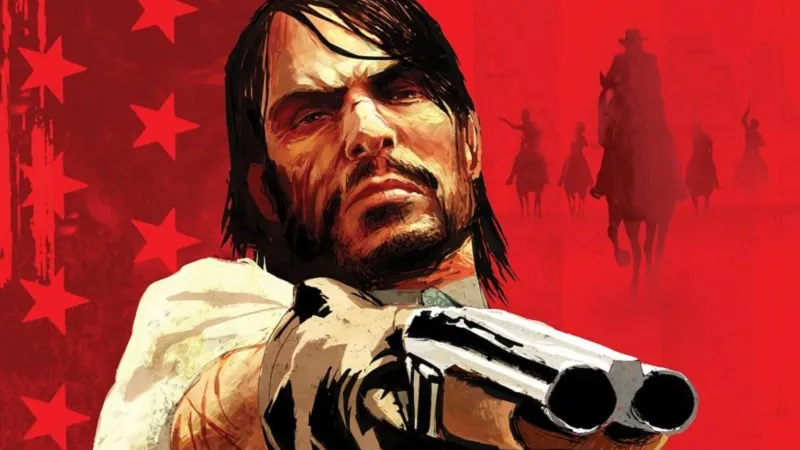
Update, 11/13/25, 2:16 p.m. ET
Earlier today, iOS and Android listings for a Red Dead Redemption mobile port were spotted on app stores, with word that the game would be available as a Netflix game next month, meaning you need a Netflix membership to play. Now, Rockstar Games has cleared the airwaves to announce that Red Dead Redemption is actually coming to PlayStation 5, Xbox Series X/S, Nintendo Switch 2, mobile iOS and Android devices, and as a mobile game via Netflix.
It's coming to all of these platforms on December 2.
On PS5 and Xbox Series X/S, Red Dead Redemption will run at 60 FPS with enhanced image quality, HDR support, and resolutions up to 4K. On Switch 2, the game will support 60 FPS gameplay at "high resolution" and DLSS, HDR, and mouse controls.
Current owners of the PS4, Switch, or digital backward compatible version of Red Dead Redemption on Xbox One can upgrade digitally for free, Rockstar says, and on PlayStation and Switch, you can pick right back up on your in-progress save. Rockstar says these new console versions were created in collaboration with Double Eleven and Cast Iron Games, and that Red Dead Redemption will be available in the GTA+ Games Library and the PlayStation Plus Catalog on December 2.
The original story continues below...
Original story, 11/13/25, 11:45 a.m. ET
Despite a recent ESRB rating for Red Dead Redemption on PlayStation 5, Xbox Series X/S, and Switch, the Rockstar Games-developed Western's next platform for play will be Netflix. That's according to new iOS and Android store listings that display Red Dead Redemption at Netflix games available starting next month, on December 4.
Because it's a mobile port of Red Dead Redemption available to play on Netflix, you will need a Netflix membership to try it out. The base game will be available in this mobile port as will its zombie apocalypse DLC, Undead Nightmare.
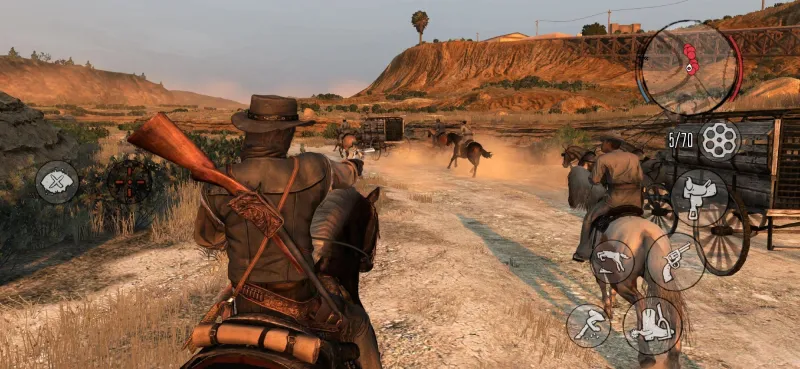
"When federal agents threaten his family, former outlaw John Marston is forced to hunt down the gang of criminals he once called friends," the app store's description reads. "Experience Marston's journey across the sprawling expanses of the American West and Mexico as he fights to bury his blood-stained past in the critically acclaimed predecessor to the 2018 blockbuster, Red Dead Redemption 2."
Though the game is a mobile port, it actually looks pretty decent, probably the result of the original game launching back in 2010.
It's currently available on those launch platforms – PlayStation 3 and Xbox 360 – and you can also play it on PlayStation 4, Xbox Series X/S (via backwards compatibility), Switch, and PC. Following a recent ESRB rating for the game on PS5, Xbox Series X/S, and Switch 2, spotted by Wario64 on Bluesky, fans expected an announcement for those platforms soon. However, it seems Netflix is next up as the new place to play Red Dead Redemption.
Red Dead Redemption is coming to iOS and Android on December 4.
In the meantime, read Game Informer's reviews of Red Dead Redemption and Red Dead Redemption II.
Are you going to try out Red Dead Redemption on your phone? Let us know in the comments below!
Red Dead Redemption Is Coming To Netflix Games Next Month, Despite Recent Rating For PS5, Xbox Series X/S, And Switch 2

Despite a recent ESRB rating for Red Dead Redemption on PlayStation 5, Xbox Series X/S, and Switch, the Rockstar Games-developed Western's next platform for play will be Netflix. That's according to new iOS and Android store listings that display Red Dead Redemption at Netflix games available starting next month, on December 4.
Because it's a mobile port of Red Dead Redemption available to play on Netflix, you will need a Netflix membership to try it out. The base game will be available in this mobile port as will its zombie apocalypse DLC, Undead Nightmare.

"When federal agents threaten his family, former outlaw John Marston is forced to hunt down the gang of criminals he once called friends," the app store's description reads. "Experience Marston's journey across the sprawling expanses of the American West and Mexico as he fights to bury his blood-stained past in the critically acclaimed predecessor to the 2018 blockbuster, Red Dead Redemption 2."
Though the game is a mobile port, it actually looks pretty decent, probably the result of the original game launching back in 2010.
It's currently available on those launch platforms – PlayStation 3 and Xbox 360 – and you can also play it on PlayStation 4, Xbox Series X/S (via backwards compatibility), Switch, and PC. Following a recent ESRB rating for the game on PS5, Xbox Series X/S, and Switch 2, spotted by Wario64 on Bluesky, fans expected an announcement for those platforms soon. However, it seems Netflix is next up as the new place to play Red Dead Redemption.
Red Dead Redemption is coming to iOS and Android on December 4.
In the meantime, read Game Informer's reviews of Red Dead Redemption and Red Dead Redemption II.
Are you going to try out Red Dead Redemption on your phone? Let us know in the comments below!
RetroSpace Devs On Immersive Sim Horror Gameplay: 'The Game Will Not Hold Your Hand At All'
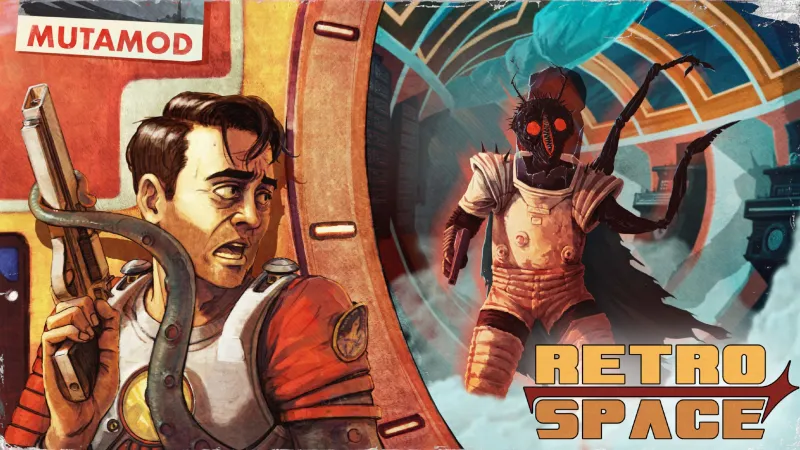
The immersive-sim genre is one of my favorites, and though it's been around for decades, developers continue to innovate greatly in the space. And I love it. You give me a strange space station à la System Shock and some horror elements, and I'm probably already sold (maybe I shouldn't be so easy?). Toss in a unique aesthetic and tone, and you certainly capture my attention.
That's why I'm excited to share a brand-new gameplay trailer for RetroSpace, an upcoming disco-punk space horror immersive sim developed by The Wild Gentlemen and set to be published by Kwalee. If you keep an eye on this genre of games, there's a good chance you've already heard of RetroSpace; if you haven't, The Wild Gentlemen describes it as a "disco-punk space horror where you can be a sneaky chap or a mutant action hero as you try to survive on a space station swallowed by a black hole."
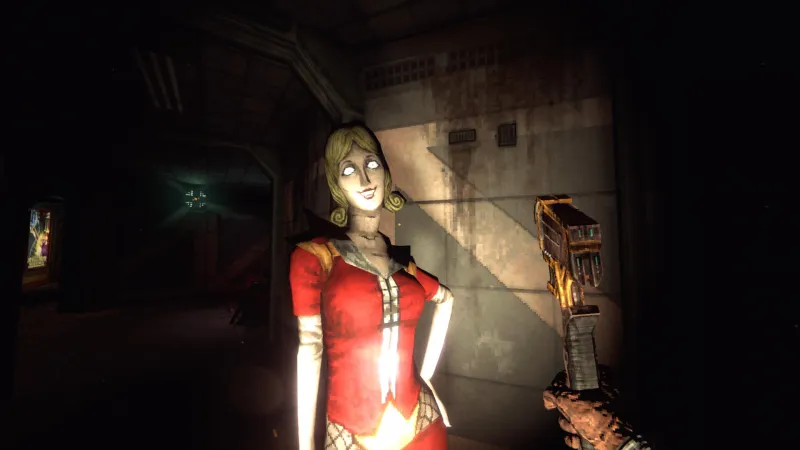
It further describes the adventure as a mind-bending ride with weird creatures, immersive features, time jumps, and '70s mustaches inspired by games like – and this is what really sold me – System Shock 2, Thief, Deus Ex, BioShock, and Prey.
You can check out all that and more in the exclusive gameplay trailer, complete with commentary from creative director Bánk B. Varga, below:
In RetroSpace, you are but a simple janitor who has been plunged into the terror of deep space, black holes, and mysterious time jumps... and you're also humanity's last hope now. You'll need to traverse the Aurora 5 station to figure out what went wrong while avoiding (or defeating) the various enemies and creatures who now call it home. You'll encounter humanoid insects, dangerous fang-bearing plant creatures, massive mutant pigs, and humans with a skin-crawling smile.
The game is an immersive sim, and the new gameplay trailer showcases how you can interact with its various physics and systems. Light oil on the ground to engulf enemies in flames; take out the lights above you to darken a space; and go in with wrenches blazing or stealthily to defeat whatever stands before you.
There's a lot more happening in RetroSpace, and I interviewed creative director Bánk B. Varga over e-mail to learn more. You can read that Q&A below:
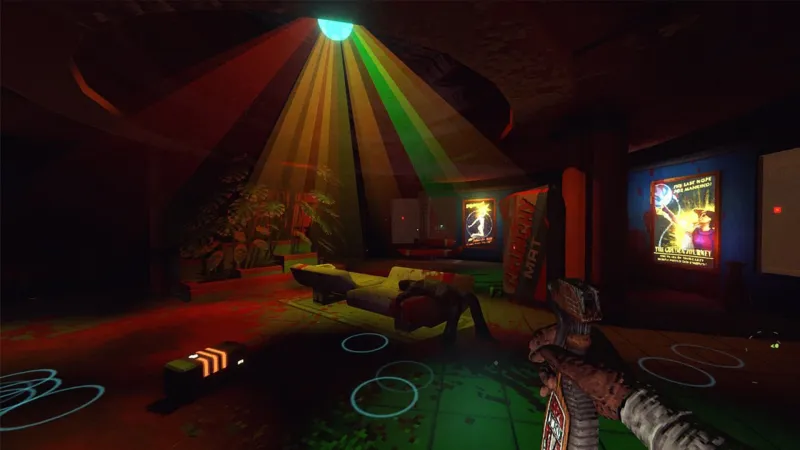
Game Informer's Wesley LeBlanc: Can you describe to me "disco-punk" and what makes RetroSpace a disco-punk space horror game?
The Wild Gentlemen's Bánk B. Varga: The name disco-punk comes from the fact that the game specifically evokes the atmosphere of the disco era, i.e., the 1970s, and the unique charm of classic sci-fi movies of the time, such as Logan's Run, Buck Rogers, and Silent Running, just to name a few. In addition, the game is characterized by a unique sense of humor, and horror – psychological horror in particular – is also one of the main elements of the game. This strange blend gave rise to the term "disco-punk space horror."
Can you tell me about the game's Prey/System Shock/Dishonored inspiration and why immersive sim was the way to go for RetroSpace?
The immersive sim nature was one of the first things we agreed on when we started designing the game. We are huge fans of the Thief series, the System Shock games, Deus Ex, Prey, and many others. We wanted to make a game that has a strong narrative thread, but still gives the player a high degree of freedom, encourages experimentation and out-of-the-box thinking, and doesn't hold the player's hand. We wanted players to immerse themselves not only in the game setting, but also in the myriad of game systems, too. We wanted them to constantly be thinking about how they could outsmart not just the enemies in the game, but the game itself and us devs.
What's the idea behind the Mutamods and the game's cloning system? How did all that come about?
We definitely wanted to give players some kind of special abilities, and that's how Mutamods came about. These are mutations derived from animal genes that allow players to create their own "builds" in the form of specific combinations of these special abilities. These include passive and active, and offensive and defensive Mutamods, so some support open confrontation, while others support stealth. In addition to Mutamods, you also have tech gadgets at your disposal, so you can just use one of the two, mix both, or even play the game without using them at all.
We wanted to use the cloning system to explain in-lore why the player can come back to life again and again. Our protagonist is a janitor whose job is extremely dangerous and often ends in death, so Aurora 5, the space station, is able to clone them indefinitely. Unfortunately, cloning is not always perfect, so each time you are reborn, you will get a kind of "cloning error," a negative effect that you will have to adapt to. You can remove this effect by extracting the genetic material from your corpse, thereby cleansing yourself of the effect. This is a system inspired by both Soulslikes games and by the traits of Void Bastards; we just gave it our unique spin.
No two playthroughs are the same, according to you. Is RetroSpace run-based, or do you mean full playthroughs of the game from start to credits? And in your words, why are no two playthroughs the same?
The game does have a somewhat fixed main storyline, but beyond that, the player is free to decide on a lot of things. There are side missions and collectibles, and often the game opens up completely and lets the player decide what to do and in what order, but what makes the game replayable the most is the variety of features, tools, abilities, and combinations available to overcome any problem, be it an enemy, a puzzle, or just a locked door.
From the beginning, we designed the game so that most problems can be solved in many different ways, and the game rewards you for trying to think outside the box. Of course, there will be simple problems with simple solutions, but for the most part, you will be free to do as you please, and the game will not hold your hand at all, so don't expect glowing quest markers or yellow-painted platform edges.
In addition to the general freedom, replayability is aided by the aforementioned cloning errors, which are guaranteed to cause unexpected situations, as well as the fact that the game will have a total of eight different endings, depending on how the player played the game.
RetroSpace is set to launch sometime in the future on PC via Steam. You can wishlist it on Steam here.
Death Stranding Isolations Is An Original Anime Series Coming To Disney+ In 2027
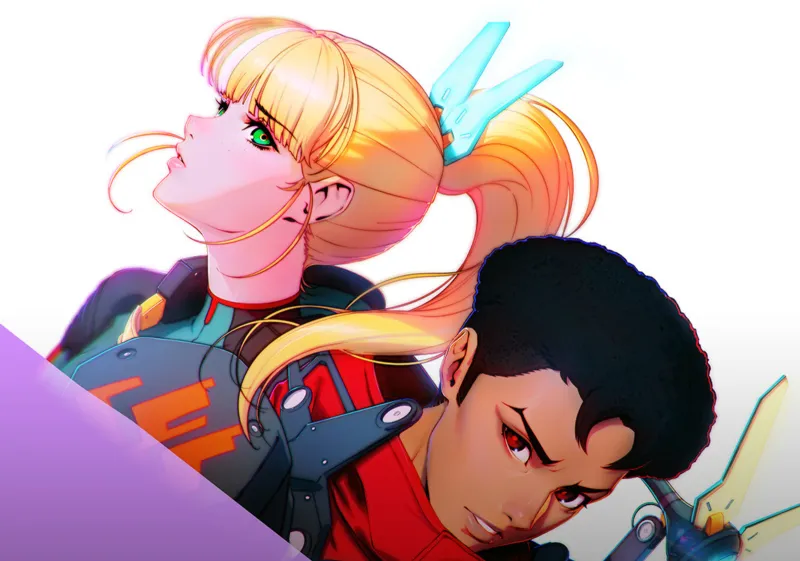
Death Stranding creator Hideo Kojima has announced that a new original anime series called Death Stranding Isolations (working title) will premiere on Disney+ in 2027. Based in Kojima Productions' Death Stranding universe, Isolation will follow a young man and woman as they set out on an adventure.
The story will be told through a traditional hand-drawn 2D animation style and created by "some of Japan's top animation talent at E&H Production, who are currently working to bring the series to life, according to the announcement page by Kojima Productions. E&H Production is a Japanese animation studio created in 2021 by former MAPPA director and animator Sunghoo Park, and is responsible for series like Ninja Kamui, Red Cat Ramen, Monsters: 103 Mercies Dragon Damnation, and Bullet/Bullet.
Here's a look at the key art for Death Stranding Isolations:
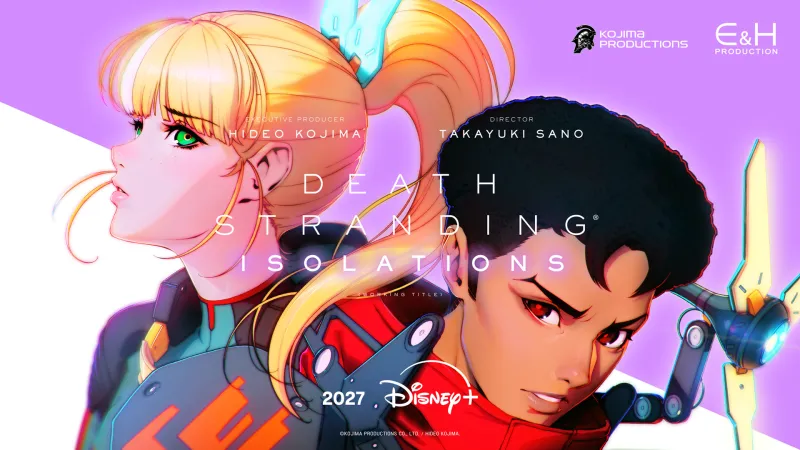
"Announced in front of a packed auditorium at the Disney+ Originals Preview at Hong Kong Disneyland Resort, executive producer of the series’ Hideo Kojima, and the series’ director Takayuki Sano, appeared on stage to announce that their first ever partnership with a global streaming platform will be with Disney+ and that the latest expansion of the Death Stranding franchise will be an animated series," according to the announcement post. "New concept art created by Ilya Kuvshinov, who served as character designer for Ghost in the Shell: SAC_2045, was also revealed along with the Death Stranding Isolations (working title) announcement."
Here's the full synopsis of Death Stranding Isolations:
Once, there was an explosion...
Lonesome souls of the dead manifest in the physical world, reaching in search of the living. However, the connection they create triggers a massive explosion that eradicates anything of this world—a phenomenon referred to as the Death Stranding. These events wipe out nations as well as civilization itself. People who remain are now isolated, withdrawn, and without connections. As humanity stands at the brink a legendary porter set out to transport both cargo and wishes of its senders, reconnecting people in the hope that they might still be saved.
Based on the video game born out of the mind of legendary game creator, Hideo Kojima, comes a new animation series headed by Japan’s up-and-coming animation studio E&H production. Helmed by E&H’s Takayuki Sano, it follows in the footsteps of the original in spirit and ideas and depict the world of Death Stranding through a bold and yet subtle touch and top-class hand-drawn animation.
Somewhere in North America, just as Sam Bridges walks through the continent in order to save America, the someones are also trying to deal with their isolation in their own way. An old man trying to realize salvation through ways outside of the connection advocated by Bridges. A female warrior who tries to kickstart a world of constant fighting. A boy with a grudge against Bridges. A girl who embraces loneliness.
On the precipice of the end of humanity and the world, their fates and hopes converge, as another story of Death Stranding begins.
And now, comes another explosion...
Death Stranding Isolations is the current working title, so the series' name could change, but when it premieres, it will do so on the Disney+ streaming service in 2027. Isolations is not to be confused with Death Stranding: Mosquito (working title), which is an animated film set in the Death Stranding universe currently in the works, or the live-action Death Stranding movie A24 is creating with A Quiet Place: Day One director Michael Sarnoski.
In the meantime, read Game Informer's reviews for Death Stranding and Death Stranding 2: On The Beach.
What kind of story do you hope Isolations tells? Let us know in the comments below!
